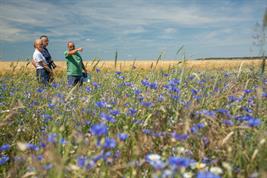05.06.2023
PRESS RELEASE

Today’s 50th World Environment Day serves as a platform to drive enhancements in national and international environmental policy. The EU research project Contracts 2.0 funded under Horizon 2020 ends after four years and, within the handbook called “Co-Creating Contracts”, is now publishing numerous recommendations to decision-makers for the EU level as well as for federal and state government levels for the design of ecologically effective, economically viable and viable agri-environmental schemes.
The President for environmental matters of the German Farmers' Association (DBV) and President of the Farmers' and Winegrowers' Association of South Rhineland-Palatinate, Eberhard Hartelt: "From farmers' point of view, biodiversity in agricultural landscapes especially succeeds when biodiversity measures are practicable and flexibly implemented by politicians and administrators. The current agricultural policy framework formally offers room for innovative approaches; politicians must actively use and promote it. In the future, innovative approaches such as results-based payments and collective schemes should be enabled, and designed to be flexible, motivating and as simply as possible to implement.”
Contracts2.0 was able to show that the many economic and ecological advantages that novel contractual solutions can bring are worth the initial effort they need. Farmers are willing to implement innovative approaches if their contractual agreements are motivating rather than restrictive and reliable rather than vague. The administrative focus should be on compliance with practical principles rather than rigid regulations.
Regarding the publication of the handbook called “Co-Creating Contracts”, the head of the research group “Governance of Ecosystem Services” at the Leibniz Centre for Agricultural Landscape Research (ZALF) and coordinator of the Contracts 2.0 project, Prof. Dr. Bettina Matzdorf reinforces: “We should show more courage in the shoulder-to-shoulder cooperation between science and practice to implement innovative approaches, such as collective and results-based agri-environmental measures, in practice and also use experimental spaces such as living labs for this purpose. If we take the ideas of the EU Commission’s Farm-to-Fork strategy seriously, we also need holistic approaches that implement a complementary rewarding of farmers’ ecological services through support policies and consumers.”
In the Contracts 2.0 project, approaches such as co-design and bottom-up principles as well as the involvement of all relevant stakeholders played a major role. In this regard, the lead scientist of the research team “Nature and Society” at the Flemish Institute for Nature and Forest Research (INBO), Dr. Francis Turkelboom, emphasises: “Involving the different knowledge holders and stimulating co-creation is one of the keys in solving challenges of the current agri-environmental schemes under European Agricultural Policy. In practice, this means simplifying bureaucracy and reducing state controls, actively involving farmers in designing and monitoring contracts, and strengthening the involvement of intermediate experts such as agricultural advisory services for high potential of innovative agri-environmental schemes.”
The published handbook entitles “Co-Creating Contracts – Designing innovative agri-environmental schemes – A guide for policymakers” can be accessed online at
www.project-contracts20.eu/results/
All results and publications of the Contracts2.0 project can be found on the website:
www.project-contracts20.eu
A summarising project video can be watched here:
https://youtu.be/kfAD_4niU48
Background:
Project Contracts 2.0, funded by the EU under Horizon 2020 for the past four years (2019-2023), has designed innovative contractual approaches for effective and sustainable agri-environmental schemes with a wide range of scientific research and participatory processes between agriculture, nature conservation and administration. A total of 28 European research and practice partners were involved under the direction of the Leibniz Center for Agricultural Landscape Research (ZALF) in Müncheberg. The Flemish Institute for Nature and Forest Research (INBO) in Brussels took the lead for the participatory co-design process and the organization of the living labs, which were at the heart of the project. The German Farmers' Association (DBV), as a practice partner, was responsible for communicating and publishing the diverse research and practice results for stakeholders from practice and politics. We thank all partners for their extraordinary commitment and contributions over the years.
Funding:
Contracts 2.0 is an EU-funded Research- and Innovation Project within the framework of Horizon 2020.
Project coordination and communication:
- Deutscher Bauernverband (DBV)
- Instituut voor Natuur- en Bosonderzoek (INBO)
- Leibniz Centre for Agricultural Landscape Research (ZALF) (coordination)
 Press Release as PDF
Press Release as PDF
Further information:
